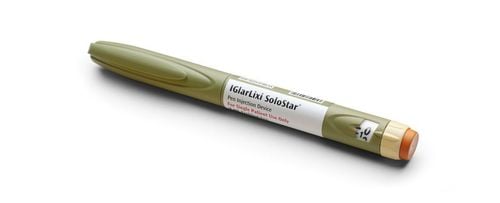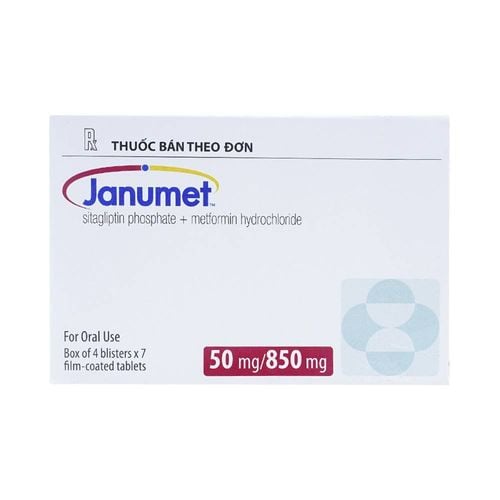This is an automatically translated article.
Wasita medicine has the main ingredient is Sitagliptin in the form of Sitagliptin phosphate monohydrate 50mg. The drug is used to treat blood sugar in patients with diabetes. Here are some useful information about Wasita medicine to help patients consult and learn to use the drug safely and effectively.
1. What is Wasita drug?
Wasita drug is a drug belonging to the group of hormones, hormones are indicated for use in treating blood sugar for patients. Wasita is manufactured in the form of film-coated tablets and packed in boxes of 10 blisters x 10 tablets.
Wasita medicine has the main ingredient is Sitagliptin 50mg and some other excipients, just enough for 1 tablet.
2. What are the uses of Wasita?
Wasita drug is used in the following cases:
Use of Sitagliptin is indicated as monotherapy for patients with type 2 diabetes. Sitagliptin is also indicated for use in combination with other drugs such as Metformin, hypoglycemic sulphamide, PPARy agonist to treat and improve glycemic control in patients with type 2 diabetes.
3. Dosage - How to take Wasita
3.1. How to use Wasita medicine is prepared in the form of film-coated tablets, to be taken orally in tablets.
3.2. Dosage The dose of Wasita drug depends on each subject and the course of the disease, there will be an appropriate dose. Below is a reference dose of Wasita as follows:
Using Wasita as monotherapy or in combination with other antidiabetic drugs, the recommended dose is 100mg of Sitagliptin/day/time. Take the medicine on an empty stomach or on an empty stomach. Using Wasita drug in combination with sulphamide hypoglycemic drugs, it is necessary to note that a lower oral dose should be used to reduce the risk of hypoglycemia for patients, due to the effect of sulphamide lowering blood sugar. For patients with renal impairment: Patients with mild renal impairment ([ClCr] ≥ 50 mL/min) do not require dose adjustment. In moderate renal failure (30 ≤ClCr < 50 mL/min), the dose is 50mg Sitagliptin/day/time. If the patient has severe renal failure (ClCr < 30mL/min), or end-stage renal disease requiring hemodialysis or peritoneal dialysis, the dose is 25mg Sitagliptin/day/time. Note that patients can take Sitagliptin at any time, regardless of the time of hemodialysis. Patients need to conduct a test and evaluate their own kidney function before starting treatment and using Wasita medicine. From there to give the dose of the drug to suit the patient's kidney condition.
4. What should be done when using Wasita drug overdose?
In clinical trials in healthy subjects a single 800 mg dose of sitagliptin was well tolerated. In a study with an 800 mg dose of Sitagliptin, the increase in QT interval was minimal and not clinically relevant. There are insufficient safety data with doses higher than 800 mg of sitagliptin in humans.
In Phase I studies of multiple-dose Sitagliptin daily regimens, no dose-related clinical adverse reactions were found when Sitagliptin was administered up to 600 mg Sitagliptin/day for 10 days and 400 mg Sitagliptin/day. days to 28 days. In case of Sitagliptin overdose, supportive measures should be applied such as removing unabsorbed substances from the gastrointestinal tract, clinical monitoring including electrocardiography and necessary supportive treatment if necessary. Sitagliptin can be hemodialysis to a moderate extent.
It has been reported that up to 13.5% of the Wasita dose is eliminated after 3-4 hours of hemodialysis. If clinically appropriate, prolonged hemodialysis may be considered. It is not known whether peritoneal dialysis can dialyzate sitagliptin, so check periodically.
5. Contraindications when using Wasita
Here are some cases where the Wasita drug should not be used to treat the disease:
Wasita should not be used for patients with hypersensitivity or history of allergy to Sitagliptin and to any of the ingredients in the drug. Wasita should not be used by women who are breastfeeding. Care should be taken when using Wasita for patients who have a career in driving or operating machinery. Because the drug contains ingredients that cause drowsiness or dizziness.
6. Wasita drug interactions
It has been reported based on clinical studies of Wasita drug interactions that Sitagliptin has no clinically relevant effect on the pharmacokinetics of the following drugs: Rosiglitazone, Metformin, Glyburid, Simvastatin, Warfarin and tablets oral contraceptives. Sitagliptin does not inhibit CYP isozymes, CYP3A4, 2C8 & 2C9. Based on in vitro data, sitagliptin also has no inhibitory effect on CYP2D6, 1A2, 2B6, 2C19 or inducer of CYP3A4.
Co-administration of Sitagliptin with Metformin at repeated twice daily doses did not significantly alter the pharmacokinetics of sitagliptin in patients with type 2 diabetes.
Population pharmacokinetic analyzes have been performed. used in patients with type 2 diabetes. Concomitant drugs that do not have a clinically significant effect on the pharmacokinetics of sitagliptin include: anti-hypercholesterolemic agents (eg, Ezetimibe, Statins, Fibrates), antidiabetic agents. hypertension (eg ACE inhibitors, calcium channel blockers, angiotensin receptor blockers, beta blockers, hydrochlorothiazide), antiplatelet drugs (eg clopidogrel), proton pump inhibitors (eg lansoprazole, omeprazol), analgesics and nonsteroidal anti-inflammatory drugs (such as Celecoxib, Naproxen, Diclofenac), antidepressants (such as Sertralin, Bupropion, Fluoxetin), antihistamines (such as Cetirizine) and drugs for erectile dysfunction (such as Sildenafil).
7. Wasita side effects
When using Wasita medicine, patients may experience some unwanted side effects that have been reported as follows:
Feeling headache. Diarrhea, abdominal pain, indigestion, nausea, vomiting. Upper respiratory tract infection, angioedema, nasopharyngitis. Fungal dermatitis. Hypoglycaemia phenomenon. When using Wasita medicine, if the above side effects appear, the patient should immediately notify the doctor or medical examination and treatment facility for timely handling measures to avoid harm to the patient.
8. Precautions when using Wasita
Wasita should not be used for patients with type 1 diabetes or used to treat ketoacidosis for patients with diabetes.
Note when using Wasita medicine for patients with kidney failure: When used, Sitagliptin will be excreted by the kidneys. Therefore, in patients with moderate and severe renal impairment to achieve the same plasma concentration of sitagliptin as in patients with normal renal function, the dose should be reduced. Patients with end-stage renal failure require hemodialysis or peritoneal dialysis.
Hypersensitivity reactions: In fact, there have been post-marketing reports of serious hypersensitivity reactions in patients treated with Wasita. There are reports that after the first dose of the drug, during the first 3 months of using Wasita, hypersensitivity reactions began to appear in patients. Hypersensitivity reactions such as: Angioedema, anaphylactic reactions and exfoliative diseases, Stevens-Johnson syndrome. If a patient is suspected of having this hypersensitivity reaction while using Wasita, it is necessary to immediately stop using Sitagliptin. Notify your doctor right away to intervene, evaluate other potential causes, and initiate alternative therapies for your diabetes.
Use of Wasita in the elderly: The safety and effectiveness of the Sitagliptin component when used at the age of ≥ 65 years will be similar to that in patients < 65 years old (younger patients). Therefore, there is no need to adjust the dose according to age.
Pregnant women: Wasita drug, like other oral drugs to treat hyperglycemia, is not recommended for use in women who are pregnant.
Lactating women: Wasita should not be used by women who are breastfeeding. Because of the fact that there have been studies that Sitagliptin was excreted into the milk of rat mothers, it is not known whether the Sitagliptin component is excreted in human milk or not.
Wasita medicine contains ingredients that cause drowsiness or dizziness in some patients. Therefore, patients who must drive and operate machinery should also pay attention and be careful when treating diseases with Wasita medicine. It is necessary to take the drug before bed to reduce the above effects during the day.
Above is important information about Wasita medicine, before using, patients should carefully read the instructions for use. Besides, this is a drug prescribed by a doctor, patients are not allowed to self-medicate without a prescription from a qualified doctor.













